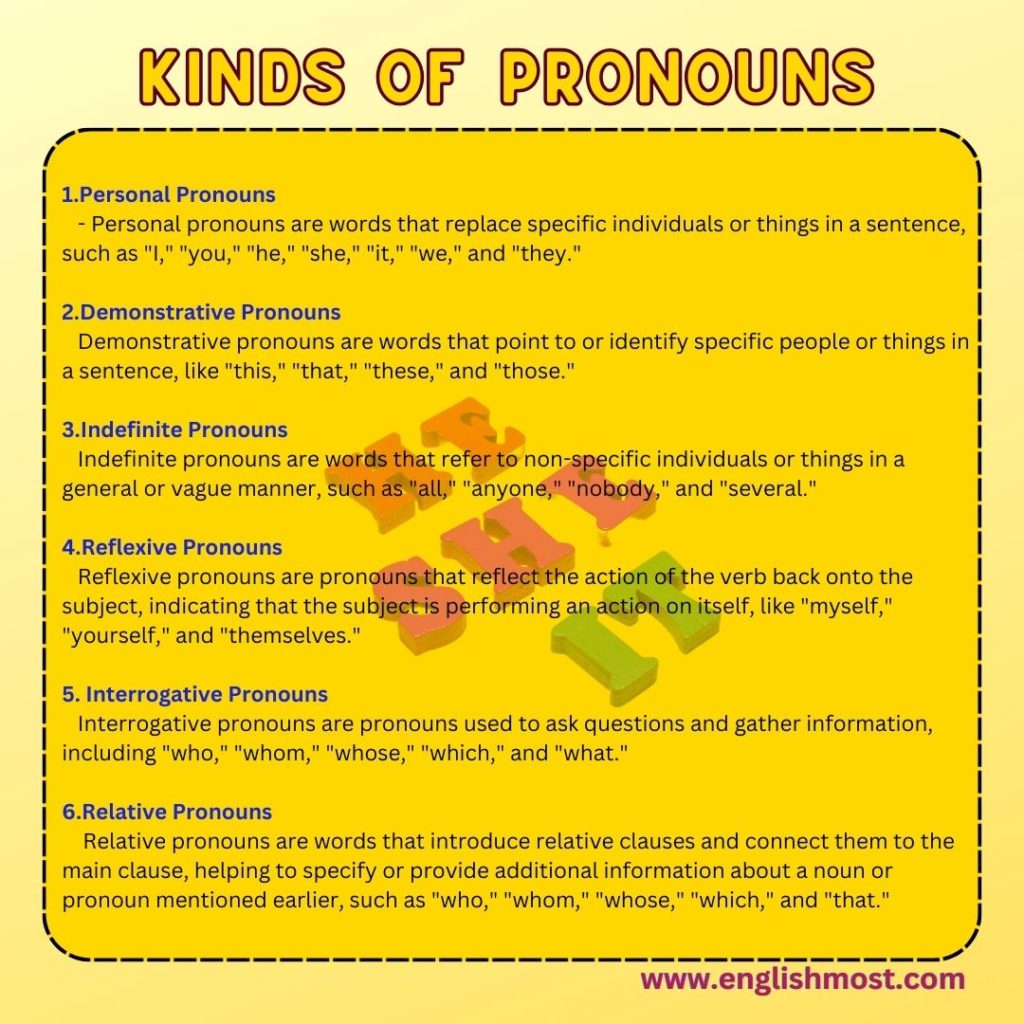A pronoun is a part of Speech. It is a word that replaces a noun or noun phrase in a sentence to avoid repetition.A pronoun makes the speech or written language sound more natural.Some examples of pronouns are, “I, we, you, they, he, she, it, you, they” and “who, whom, whoever, somebody”, etc. There are more types of pronoun.Let’s talk about them.
Types Of Pronoun
Here are the types of pronoun.
- Personal Pronouns
- Demonstrative Pronouns
- Indefinite Pronouns
- Reflexive Pronouns
- Interrogative Pronouns
- Relative Pronouns
Personal Pronouns
| Subjective Pronouns | Objective Pronouns | Possessive Pronouns |
|---|---|---|
| I | me | my, mine |
| you | you | your, yours |
| she | her | her, hers |
| he | him | his |
| they | them | their, theirs |
| we | us | our, ours |
| it | it | its |
Personal pronouns replace the names of persons or sometimes animals.They are used in subject or object positions.
I told her an interesting story.
She told me an interesting story.
In the first sentence “I”is in the place of the subject.since “I” is the one doing the action. When it is in the object positionit will change into “me”.
Likewise when “she” is in the subject position it is simply “she”. when it acts an an object it becomes “her” since she is the one receiving the action. The same way any female name will turn into “she” as subject and “her” as an object.
Possessive pronouns are pronouns which show possession of something.In the same way:
We can say for example:
Michael owns a big house.The house across the street is Michaels’s house.
Instead of repeating Michael’s house, we can say:
Michael owns a big house.The house across the street is his.

Here is a quiz for personal Pronouns:
Multiple Choice Personal Pronoun Quiz
Demonstrative Pronoun
The Demonstrative Pronouns are used to point to a specific object. Some examples are
this, that, these, those.
Look at these examples:
- This is my sister’s purse.
- That looks like the bicycle I used to ride.
- These are not well knows books.
- Those apples are bigger than the one’s we bought last time.
Here is a quiz for Demonstrative Pronouns:
Multiple Choice Demonstrative Pronouns Quiz
Indefinite Pronouns
Indefinite Pronouns are pronouns that do not indicate an exact person or object such as someone, no body, anybody.Some more examples of indefinite pronouns are either, neither, any, some, several, many etc.
- Nobody wants to travel in icy weather.
- Some of my friends live in rural areas.
- Can anyone tell me the answer to this question?
Here is a quiz for Indefinite Pronoun.
Multiple Choice Indefinite Pronouns Quiz
Reflexive Pronoun
Reflexive Pronouns are the pronouns that reflect back to the subject.
| Subjective Pronouns | Reflexive Pronouns |
|---|---|
| I | myself |
| we | ourselves |
| you | yourself, yourselves |
| they | themselves |
| he/she | himself/herself |
| it | itself |
- I fixed my lawn all by myself.
- Sara created an amazing art project all by herself.
- The Smiths went to the US five years ago. They established themselves very well within a short time.
Reflexive Pronouns Multiple Choice Quiz
Interrogative Pronouns
Interrogative pronouns are used to ask questions. The interrogative pronouns are what, which, who , whose, whom:
- What would you like for lunch?
- Which colour would you like for your car?
- Who is that weird guy?
- Whom are you going with to the party?
Interrogative Pronouns Multiple Choice Quiz
Relative Pronouns
Relative Pronouns are used to introduce relative, subordinate clauses. They work like conjunctions in joining two sentences.Examples are who, whom, whose, that, which, whoever, whomever etc.
Look at these examples:
- The guy who is waving is my friend.
- This is the house which was built in 18th century.
- The book, that I was reading, captured my interest every passing minute.
- In the group of four students, whoever is selected, will lead the group.
Relative Pronouns Multiple Choice Quiz
Get more practice of English Grammar by following Interactive Grammar Quizzes.
